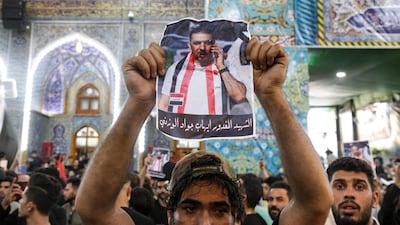There's little hope of Iraqi authorities bringing the killers of Ihab Al Wazni and other activists to justice, human rights groups and activists said.
The civil society activist was shot dead last week in Karbala. His death sparked daylong protests in the southern holy city that saw demonstrators block roads and bridges with burning tyres.
"The groups behind these killings are extremely powerful to the point that the Iraqi state and law enforcement system is unable to hold them to account," Belkis Wille, a senior researcher at Human Rights Watch, told The National.
“It means we have incredibly powerful armed groups that can perpetrate crimes with impunity on the streets of Iraq in broad daylight and the state cannot do much to curb these attacks."
Calls to the Iraqi Prime Minister's office and the Interior Ministry failed to obtain a comment on the investigation. Iraqi authorities had opened an immediate investigation after the incident, but have yet to announce the perpetrators.
Real accountability and justice will not prevail and the attacks against members of Iraq’s civil society and journalists will continue as long as armed groups are able to “instill fear and silence criticism”, Ms Wille said.
Militias linked to political parties, some backed by Iran, have tightened their grip over state institutions since the US invasion that toppled former dictator Saddam Hussein in 2003.
Prime Minister Mustafa Al Kadhimi, who took office in May, has pledged justice for activists killed or abused by armed groups, and has faced off against some Iran-backed parties.
Al Wazni's assassination triggered outrage at the government's lack of action in providing civilian protection, basic public services and jobs. Al Wazni was a vocal opponent of corruption, the stranglehold of Tehran-linked armed groups and Iran's influence in Iraq.
Nationwide anti-government protests, which began in late 2019, resulted in the killing, arrests and forced disappearances of hundreds of people whose families are still waiting for news of their fate.
"There is no progress on the ground concerning the investigation or accountability processes,'' Ali Al Bayati, a member of the semi-official Iraqi Human Rights Commission, told The National.
“Unfortunately, impunity is the usual end of such crimes which encourages the perpetrators to not stop and intimidate and the assaults will continue,” Mr Al Bayati said.
Dhia Al Hindi, one of the youngest leaders of the protest movement in Karbala, told The National that Al Wazni was the third member of the movement killed by Iranian-back militias that operate in the south.
“We believe that the Iraqi government knows exactly who killed Al Wazni and the two other men just as we know,” Mr Al Hindi said, who is running the upcoming elections. “The killers are working under the cover of the government, they are sides that are loyal to Iran.”
"We have conducted so many protests to pressure the government to punish the killers but nothing has been made," Mr Al Hindi said. "The truth will not prevail under a weak prime minister like Mustafa Al Kadhimi."
The area where Al Wazni was shot is a very secure one, surrounded by CCTV cameras, he said.
“This means whoever conducted the assassination works in the government, and the authorities are aware of this,” Mr Al Hindi said.
Civil society has lost hope that the government will reveal the identities of the perpetrators, said Hassan Wahab, from the Baghdad-based Al Amal human rights group.
“I don’t think the Iraqi government will be serious this time in revealing the killers of Ihab Al Wazni because it has already made many promises that have not been fulfilled,” Mr Wahab said. “Due to the despair of achieving justice the rhetoric of protesters has changed, it has escalated and they’ve threatened to boycott the upcoming elections.”


